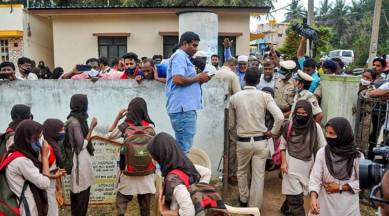Stay updated with the latest - Click here to follow us on Instagram
‘If turban, bangles are allowed, why target hijab alone?’: Petitioners ask Karnataka HC
The advocate for petitioners also argued that the discrimination is even starker because there is no prescribed uniform for students in pre-university colleges in the state and as a consequence there is no rule that imposes a ban on the hijab.

Even as different religious symbols such as bangles and turbans are common in Indian society, the government targeting only Muslim women for their headscarves is an example of “hostile discrimination”, the advocate for petitioners told the Karnataka High Court on Wednesday during the hearing on the hijab row. He also argued that the discrimination is even starker because there is no prescribed uniform for students in pre-university colleges in the state and as a consequence there is no rule that imposes a ban on the hijab.
The former advocate general of Karnataka Ravi Varma Kumar told a full bench of the Karnataka High Court that in the absence of any state-prescribed uniforms, the efforts being made to prevent Muslim girls wearing hijab from attending classes amounted to “discrimination” on the basis of religion, which is prohibited under Article 15 of the Constitution.
monthly limit of free stories.
with an Express account.
“Hindus, Sikhs and Christians have their religious symbols. I want to highlight the plurality and diversity that exists in our society. Why has the hijab only been chosen for this hostile discrimination? Is it not because of religion?” Kumar told the court.
“Should we prohibit turbans for Sikhs? Girls wear bangles also. Why is there this discrimination against poor Muslim girls?” he asked, stating that under Article 15 which says the state should not discriminate against citizens on the basis of their religion, race, caste, sex and birthplace.
Preventing girls wearing hijab from attending classes is “only because of religion” because there is no such “discrimination” against those wearing dupatta, bangle, bindi or carrying the crucifix, Kumar said.
“If people wearing the turban can be in the army, why can a person wearing a religious symbol—(it’s) her right to practice her religion—not be allowed to attend classes. It is a draconian decision where universal education is desired, particularly girls’ education. The court may take judicial note of the fact that among girls, Muslim girls are the least educated and the least represented in classrooms. If they are shut out on the grounds of such discrimination, that would amount to the doomsday for their education,” the former AG said.
He also argued that the aim of education is to promote plurality, and not uniformity. “It is about unity in diversity,” Kumar said.
He further pointed out that there is no uniform for students in PU colleges, and also no rule under the Karnataka Education Act of 1983 that prohibits wearing the hijab. “What I want to know is how I am being kept out of class and under what rule? Who has authorized such an act?” he said.
A prospectus for pre-university colleges run by the state government says that recommending any kind of uniform for students is illegal. “It is a statement of fact that no uniform is prescribed. The government order also recognizes the fact that no uniform is prescribed by the government,” Kumar stated.
Senior advocate Yusuf Muchhala, who argued on behalf of the Udupi college students, said that any government order that seeks to stop girls wearing the hijab from attending classes is tantamount to what the courts recognize as “manifest arbitrariness”. It also violates the “doctrine of proportionality” that exists in law, he added.